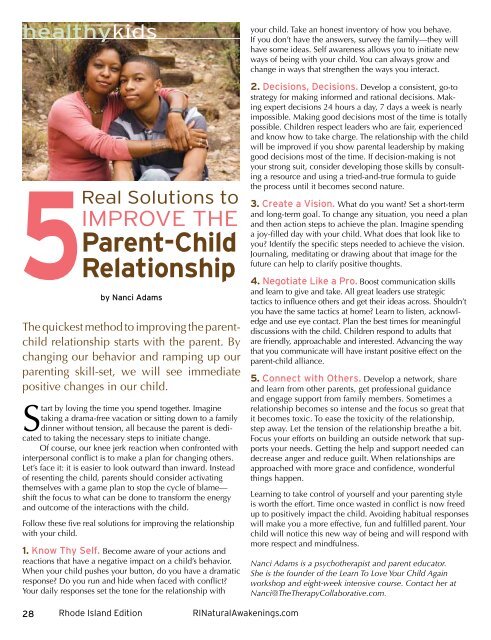Providence, RI - Natural Awakenings
Providence, RI - Natural Awakenings
Providence, RI - Natural Awakenings
Create successful ePaper yourself
Turn your PDF publications into a flip-book with our unique Google optimized e-Paper software.
healthykids<br />
5Real Solutions to<br />
IMPROvE THE<br />
Parent-Child<br />
Relationship<br />
by Nanci Adams<br />
The quickest method to improving the parentchild<br />
relationship starts with the parent. By<br />
changing our behavior and ramping up our<br />
parenting skill-set, we will see immediate<br />
positive changes in our child.<br />
Start by loving the time you spend together. Imagine<br />
taking a drama-free vacation or sitting down to a family<br />
dinner without tension, all because the parent is dedicated<br />
to taking the necessary steps to initiate change.<br />
Of course, our knee jerk reaction when confronted with<br />
interpersonal conflict is to make a plan for changing others.<br />
Let’s face it: it is easier to look outward than inward. Instead<br />
of resenting the child, parents should consider activating<br />
themselves with a game plan to stop the cycle of blame—<br />
shift the focus to what can be done to transform the energy<br />
and outcome of the interactions with the child.<br />
Follow these five real solutions for improving the relationship<br />
with your child.<br />
1. know Thy Self. Become aware of your actions and<br />
reactions that have a negative impact on a child’s behavior.<br />
When your child pushes your button, do you have a dramatic<br />
response? Do you run and hide when faced with conflict?<br />
Your daily responses set the tone for the relationship with<br />
28 Rhode Island Edition <strong>RI</strong><strong>Natural</strong><strong>Awakenings</strong>.com<br />
your child. Take an honest inventory of how you behave.<br />
If you don’t have the answers, survey the family—they will<br />
have some ideas. Self awareness allows you to initiate new<br />
ways of being with your child. You can always grow and<br />
change in ways that strengthen the ways you interact.<br />
2. Decisions, Decisions. Develop a consistent, go-to<br />
strategy for making informed and rational decisions. Making<br />
expert decisions 24 hours a day, 7 days a week is nearly<br />
impossible. Making good decisions most of the time is totally<br />
possible. Children respect leaders who are fair, experienced<br />
and know how to take charge. The relationship with the child<br />
will be improved if you show parental leadership by making<br />
good decisions most of the time. If decision-making is not<br />
your strong suit, consider developing those skills by consulting<br />
a resource and using a tried-and-true formula to guide<br />
the process until it becomes second nature.<br />
3. Create a Vision. What do you want? Set a short-term<br />
and long-term goal. To change any situation, you need a plan<br />
and then action steps to achieve the plan. Imagine spending<br />
a joy-filled day with your child. What does that look like to<br />
you? Identify the specific steps needed to achieve the vision.<br />
Journaling, meditating or drawing about that image for the<br />
future can help to clarify positive thoughts.<br />
4. Negotiate Like a Pro. Boost communication skills<br />
and learn to give and take. All great leaders use strategic<br />
tactics to influence others and get their ideas across. Shouldn’t<br />
you have the same tactics at home? Learn to listen, acknowledge<br />
and use eye contact. Plan the best times for meaningful<br />
discussions with the child. Children respond to adults that<br />
are friendly, approachable and interested. Advancing the way<br />
that you communicate will have instant positive effect on the<br />
parent-child alliance.<br />
5. Connect with Others. Develop a network, share<br />
and learn from other parents, get professional guidance<br />
and engage support from family members. Sometimes a<br />
relationship becomes so intense and the focus so great that<br />
it becomes toxic. To ease the toxicity of the relationship,<br />
step away. Let the tension of the relationship breathe a bit.<br />
Focus your efforts on building an outside network that supports<br />
your needs. Getting the help and support needed can<br />
decrease anger and reduce guilt. When relationships are<br />
approached with more grace and confidence, wonderful<br />
things happen.<br />
Learning to take control of yourself and your parenting style<br />
is worth the effort. Time once wasted in conflict is now freed<br />
up to positively impact the child. Avoiding habitual responses<br />
will make you a more effective, fun and fulfilled parent. Your<br />
child will notice this new way of being and will respond with<br />
more respect and mindfulness.<br />
Nanci Adams is a psychotherapist and parent educator.<br />
She is the founder of the Learn To Love Your Child Again<br />
workshop and eight-week intensive course. Contact her at<br />
Nanci@TheTherapyCollaborative.com.





